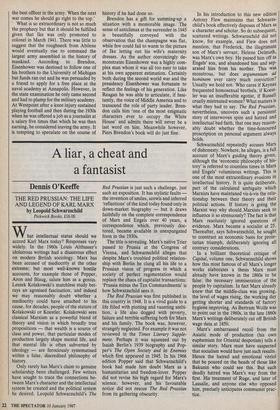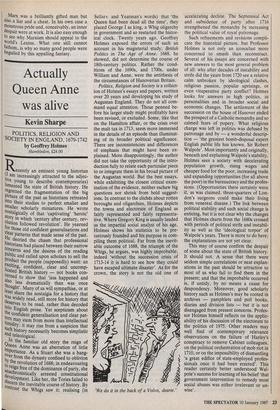A liar, a cheat and a fantasist
Dennis O'Keeffe
THE RED PRUSSIAN: THE LIFE AND LEGEND OF KARL MARX by Leopold Schwarzschild
Pickwick Books, £16.00
What intellectual status should we accord Karl Marx today? Responses vary widely. In the 1960s Louis Althusser's idolatrous writings had a disastrous effect on modern British sociology. Marx has been accused of mediocrity at the other extreme; but most well-known hostile accounts, for example those of Popper, Aron and Blaug, salute him as a genius. Leszek Kolakowski's matchless study bet- rays an agonised fascination, and indeed we may reasonably doubt whether a mediocrity could have attached to his cause, for decades, people of the stature of Kolakowski or Koestler. Kolakowski sees classical Marxism as a powerful blend of theory and vision in which broadly true propositions — that wealth is a source of class and power, that particular modes of production largely shape mental life, and that mental life is often subverted by ideology — are ferociously systematised within a false, discredited philosophy of history.
Only rarely has Marx's claim to genuine scholarship been challenged. Few writers have sought to trace the connections be- tween Marx's character and the intellectual system he created and the political system he desired. Leopold Schwarzschild's The Red Prussian is just such a challenge, just such an exposition. It has stylistic faults — the invention of smiles, scowls and inferred 'reflections' of the kind today found only in down-market biography — but it draws faithfully on the complete correspondence of Marx and Engels over 40 years, a correspondence which, previously doc- tored, became available in unexpurgated form in the 1930s.
The title is revealing. Marx's native Trier passed to Prussia at the Congress of Vienna, and Schwarzschild alleges that despite Marx's troubled political relation- ship with Berlin he clung all his life to a Prussian vision of progress in which a society of perfect regimentation would replace the chaos of capitalist transactions: 'Prussia minus the Ten Commandments' is how Schwarzschild sees it.
The Red Prussian was first published in this country in 1948. It is a vivid guide to a life filled with plotting and vaunting ambi- tion, a life also dogged with poverty, failure and terrible suffering both for Marx and his family. The book was, however, strangely neglected. For example it was not reviewed in the Times Literary Supple- ment. Perhaps it was squeezed out by Isaiah Berlin's 1939 biography and Pop- per's The Open Society and its Enemies which first appeared in 1945. In his 1966 edition Popper said that Schwarzschild's book had made him doubt Marx as a humanitarian and freedom-lover. Popper did not revise his high regard for Marx's science, however, and his favourable notice did not rescue The Red Prussian from its gathering obscurity. In his introduction to this new edition Antony Flew maintains that Schwarzs- child's book effectively disposes of Marx as a character and scholar. So do subsequent, scattered writings. Schwarzschild did not know, for example, and Flew does not mention, that Frederick, the illegitimate son of Marx's servant, Helene Delmuth, was Marx's own boy. He passed him off as Engels' son, and abandoned him and sep- arated him from his mother. This was monstrous, but does argumentum ad hominem ever carry much conviction? Usually we hold not. Who cares if Keynes frequented homosexual brothels, if Koest- ler was an insufferable egotist, if Russell cruelly mistreated women? What matters is what they had to say. The Red Prussian, nevertheless, uncovers such a persistent story of interwoven spite and hatred and intellectual bad faith, that one may reason- ably doubt whether the time-honoured proscription on personal argument always holds.
Schwarzschild repeatedly accuses Marx of dishonesty. Nowhere, he alleges, is a full account of Marx's guiding theory given, although the 'economic philosophy of his- tory' is referred to countless times in Marx and Engels' voluminous writings. This is one of the most extraordinary evasions in intellectual history. It is quite deliberate, part of the calculated ambiguity which Marxists have maintaned vis-à-vis the rela- tionship between their theory and their political actions. If history is going the Marxist way why should, Marxists seek to influence it so strenuously? The fact is that Marx resolutely ignored questions of evidence. Marx became a socialist at 25. Thereafter, says Schwarzschild, he sought to construct an economic basis for prole- tarian triumph, deliberately ignoring all contrary considerations.
In a brilliant theoretical critique of Capital, volume one, Schwarzschild shows how this most famous of all Marx's longer works elaborates a thesis Marx must already have known in the 1860s to be false: the necessary immiseration of the people by capitalism. In fact Marx already knew that the middle-class was growing, the level of wages rising, the working day getting shorter and standards of factory hygiene improving. As Bertram Wolfe was to point out in the 1960s, in the late 1860s Marx's writings deliberately cut off British wage data at 1850.
Marx's embarrassed recoil from the Asiatic mode of production (his own euphemism for Oriental despotism) tells a similar story. Marx must have suspected that socialism would have just such results. Hence the hatred and emotional vitriol that he poured on the heads of those like Bakunin who could see this. But such deadly hatred was Marx's way from the first. His treatment of Ruge, and later of Lassalle, and anyone else who opposed him, precisely anticipates communist prac- tice. Marx was a brilliantly gifted man but also a liar and a cheat. In his own case a monstrous pride and, conceivably, an inner despair were at work. It is also easy enough to see why Marxism should appeal to the World's Lenins. What one still cannot fathom, is why so many good people were beguiled by this appalling fantasy.











































 Previous page
Previous page